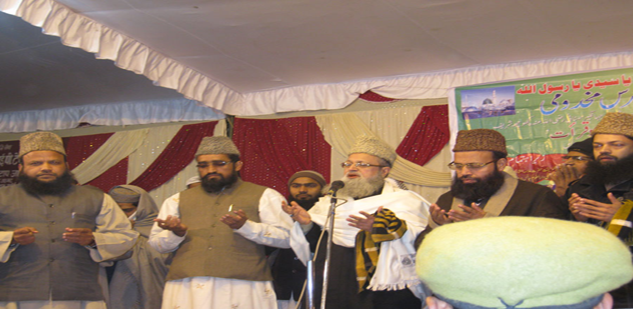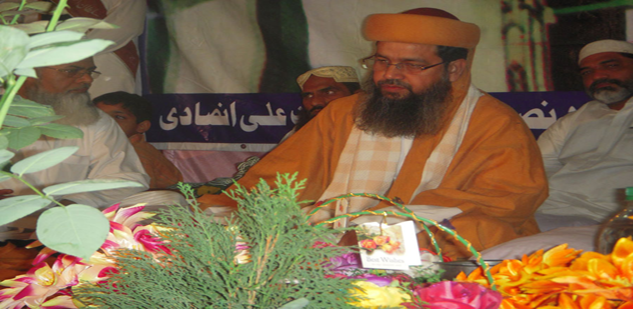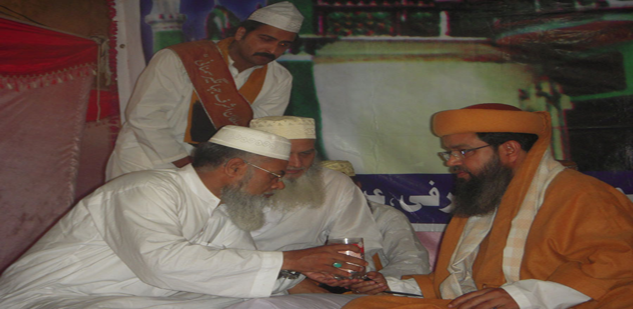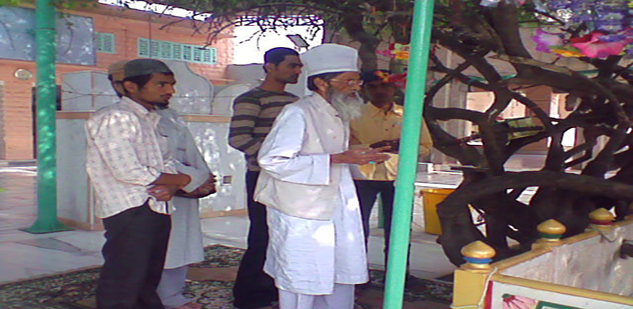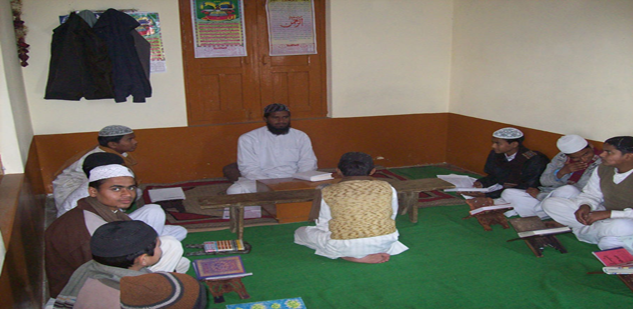
Zakaat is a monetary devotion and an Ibaadat that has been ordained in the Shariats of all the Ambiya. Zakaat is one of the five pillars of Islam.
Zakaat literally means to increase. Technically it means lo purify one's position of wealth by distributing a prescribed amount which has to be given to the poor as a fundamental Ibaadat. Zakaat is not a governmental tax, but its main purpose is to keep those who are wealthy clean monetarily from sins.
Zakaat was made compulsory at Makkah at the same time as Salaat. This can be seen in the Surahs of the Qur'aan where the laws of Zakaat are mentioned. The amount, distribution, etc. was defined at Madinah in the second year Hijri.
Allah Ta'aala says in the Qur'aan, "Allah destroys wealth obtained from interest and will give increase for deed of charity." (Surah Baqarah:276)
1. Rasulullah ![]() has said, "The nation that does not give Zakaat, Allah will bring about a drought on them (i.e. necessities of life, will become scarce.)"
has said, "The nation that does not give Zakaat, Allah will bring about a drought on them (i.e. necessities of life, will become scarce.)"
2. "The persons on whom Allah has bestowed wealth, and he does not give Zakaat, on the Day of Qiyaamah, his wealth will be turned into a venomous bald serpent which will wind around his neck and bite his jaws and say, "I am your wealth, I am your treasure." (Bukhari)
It is stated in the Hadith that by giving Zakaat the following benefits are derived:
1. Gaining of the pleasure of Allah;
2. Increase in wealth;
3. Protection from losses;
4. A cause thus established for Allah's forgiveness and blessings are obtained;
5. Safety from calamities;
6. Protection from the wrath of Allah and from a bad death;
7. The Zakaat will provide a shelter on the Day of Judgement;
8. Security from seventy misfortunes;
9. It will serve as a shield from the fires of Jahannam;
10. It contributes to Barkat in wealth;
11. It saves from fear and grief.
There are two major benefits of giving Zakaat:
1. It keeps one away from sin and saves the giver from moral ill arising from the love and greed for weatlh;
2. Through Zakaat the poorer class (those, who are not capable of providing for themselves) are being cared for, such as widows. orphans, the disabled, the poor and the destitute.
The punishment for not giving Zakaat
Allah Ta'aala says in the Qur'aan, "And there are those who hoard gold and silver and do not spend it in the way of Allah, announce to them a most grievous penalty (when) on the Day of Qiyaamah heat will be produced out of that wealth in the fire of Jahannam, then with ii they will be branded on their foreheads and their flanks and backs. (It will be said to them) This is the treasure which you hoarded for yourselves, taste then the treasure that you had been hoarding." (Surah Taubah:34)
Zakaat is Farz upon a person if: -
1. He is a Muslim;
2. He is an adult;
3. He is a sane person;
4. He is a free person;
5. He owns wealth intended for trading to the value of Nisaab.
Furthermore the wealth should be:
a. Fully owned by him;
b. In excess of his personal needs (clothing, household furniture, utensils and cars etc. are termed as articles of personal use),
c. It should be possessed by him for a complete lunar year;
d. Of a productive nature from which he can derive profit or benefit such as merchandise for business, gold, silver, livestock, etc.
There is no Zakaat on effects that are not of a productive nature even if these are in excess of one's needs, such as cars, utensils, furniture etc. If such items are not intended for trade.
Note:- Zakaat is Farz. Any person who denies it being Farz (compulsory) loses his Imaan. However if he recognizes Zakaat being Farz but neglects this duty he will be termed a Faasiq (Transgressor).
Types of wealth on which Zakaat is Farz
1. Zakaat is Farz on gold and silver, be it in the form of bullion, jewellery, cash, bank notes, utensils or any other form. The value of these should be equal to the amount which is shown under Nisaab rate.
2. If the gold possessed is not equal fo the value of 87,48 grams, or silver possessed is not equal to the value of 612,36 grams, but the value of both combined is equal to the value of either the Nisaab of gold or siiver, then Zakaat will be Farz.
3. In the event of an article not being of pure gold or pure silver, but containing a mixture of other metals and the gold or silver is more than the other metal, it will be regarded as gold or silver and Zakaat on this will be Farz. But in this case where the metal is of greater quantity than either the gold or silver, Zakaat will not be Farz on that article.
4. If a person has 620 grams of silver (which is more than the Nisaab) and before a whole year has elapsed he acquires 50 grams of gold (which is less than the Nisaab), then the value of this gold must be added to the value of the silver, and thereafter the Nisaab reckoned. The two must not be reckoned separately, as this will be a cause of avoiding Zakaat.
5. Zakaat is Farz on merchandise for business, equal to the value of Nisaab.
6. Zakaat is Farz on livestock.
7. Zakaat is Farz on the income of propertles if it is equal to the value of Nisaab.
8. Zakaat is Farz on the income derived from a hiring business, such as crockery, motor cars, vans, trucks etc.
Types of wealth on which Zakaat is not Farz
1. Zakaat is not Waajib on any other metal besides gold and silver.
2. Zakaat is not Waajib on fixtures and fittings of a shop, motor car, truck or any delivery vehicle etc, which is used in running a business.
3. There is no Zakaat on diamonds, pearls, other precious or semi-precious stones which are personal use. Zakaat is payable on the gold or silver used in making jewellery with diamonds, pearls etc. There is no Zakaat on imitation jewellery.
4. There is no Zakaat on any number of living quarters, household furniture, crockery, personal clothing, whether they are in use or not. However, Islam does not justify extravagance.
5. There is no Zakaat on a person whose liabilities exceed or equal his assets.
6. A person has R300-00, but owes R200-00. Zakaat is due on the remaining R100-00.
Animals on which Zakaat is Farz
1. It is compulsory to give Zakaat on camels cattle, water buffaloes, goats and sheep. (any such Halaal animal that can be slaughtered for Qurbani in terms of Shariat) when they
a.graze on the open field for the greater part of the year and are not stall fed;
b. are kept for milk, breeding or fattening. Such animals are termed 'Saa'imah'.
2. Zakaat on Saa'imah animals is calculated on number and not value therefore stud or throughbred animals and crossbred animals are treated alike for Zakaat purposes.
3. Where animals are kept for trade, Zakaat will be calculated and given as is done in commercial establishments.(i.e. on the monetary value of each animal) The Nisaab is the same as that of trading.
4. If one has a mixed flock of goats and sheep and the number of each kind individually makes Zakaat applicable then the Zakaat of each respective group will be given from its own kind.
5. When the number of each type of animal individually does not make Zakaat binding, but the total of both kinds does amount to the Nisaab then Zakaat will be given from the type of animal that is greater in number.
6. If both kinds are equal in number, one has the option of choosing the Zakaat animal from whichever kind he desires. It must be noted that the Zakaat animal should he of a good quality.
Animals on which Zakaat is not Farz
1. Animals that are stall fed for six months of the year and then left to graze on the field for the remainder of the year are not 'Saa'imah' and thus no Zakaat will be liable on their owner.
2. There is no Zakaat payable on animals which are reared for riding, or for drought purposes or for one's own use or consumption.
3. There is no Zakaat on wild game.
4. There is no Zakaat on horses, donkeys and mules if they are not for trade.
5. There is no Zakaat on a herd which consists of calves only i.e. until they reach a capable age of breeding. If such a herd has one animal that could be used for breeding, then Zakaat will have to be given on all of them. In this case that particular full grown animal will have to be given as Zakaat. If this animal which is capable of breeding dies, then Zakaat will still necessary uppn the rest of the herd calves.
6. Zakaat is not applicable on sheep that are less than twelve months old.
The amount of wealth which makes one liable for Zakaat is called Nisaab.
The payment of Zakaat is compulsory on the excess wealth or effects which is equal to/or exceeds the value of Nisaab, and which is possessed for a full Islamic year. If such wealth decreases during the course of the year, and it increases again to the value of Nisaab before the end of the year, the Zakaat then must be calculated on the full amount that is possessed at the end of the year.
The Nisaab of gold and silver fixed by Rasulullah ![]() is as follows
is as follows
Nisaab |
Nisaab |
Grams |
Tolas |
Grams |
Troy oz. |
Gold |
20 Mithqaals |
37.48 |
7.5 |
1350 |
2.8125 |
Silver |
200 Dirhams |
612.36 |
52.5 |
9450 |
19.6875 |
The rate of Zakaat which was fixed by Rasulullah ![]() is 2.5% (1/40) i.e, 2.5 cents in a rand.
is 2.5% (1/40) i.e, 2.5 cents in a rand.
The time and Nisaab of Zakaat for livestock
1. The owner must have possession of animals for one lunar year before Zakaat becomes Fardh.
2. The Nisaab for 'Saa'imah' animals is governed by the number of animals in ones ownership and not by the monetary value of each animal. (refer to tables for detail)
Table of Zakaat for sheep and goats
The Nisaab (minimum number) when Zakaat becomes applicable is forty animals which are more than twelve months old. There is no Zakaat of the number is less than forty.
|
Zakaat |
Number |
1 year old |
40 - 120 |
1 animal |
121 - 200 |
2 animals |
201 - 399 |
3 animals |
400 |
4 animals |
Thereafter for each additional hundred, one sheep that is one year old must be given as Zakaat.
Table of Zakaat for cattle and water buffaloes
The Nisaab when Zakaat becomes applicable is thirty animals. There is no Zakaat if the number is less than thirty.
|
Zakaat |
Zakaat |
Number |
1 year old |
2 year old |
30 - 39 |
1 animal |
|
40 - 59 |
|
1 animal |
60 - 69 |
2 animals |
|
Thereafter, in every thirty animals, one 1 year old animal should be given and in every forty, a two year old animal should be given as Zakaat. Example: -
|
Zakaat |
Zakaat |
Number |
1 year old |
2 year old |
70 |
1 animal |
1 animal |
80 |
|
2 animals |
90 |
3 animals |
|
100 |
2 animals plus |
1 animal |
110 |
1 animal plus |
2 animals |
120 |
4 animals or |
3 animals |
The Niyyat (intention) of Zakaat
1. It is Fardh to form a niyyat for the fulfilment of Zakaat.
2. When giving Zakaat to a needy person, the niyyat should be that, "I am giving this as Zakaat." If the niyyat is not made the Zakaat will not be valid.
3. It is not necessary to reveal to the needy person to whom Zakaat is given, that the cash or kind which is being given to him is Zakaat.
4. When one has put aside an amount for Zakaat with the intention that he will give it to the needy, and at the time of giving Zakaat he forgets to make the niyyat, the Zakaat will still be valid.
5. If one gives a deserving person some money as a gift but makes the niyyat of Zakaat, the Zakaat will be valid.
The method of distributing Zakaat
1. Zakaat is Fardh at the rate of 2.5%.
2. Zakaat should be given as soon as possible after it becomes due. It is possible that death may occur and thus lead to failure in fulfilling ones obligations.
3. A poor man cannot be paid for his work from Zakaat nor can Zakaat be given in payment of anyones services except when an Islaamic government pays salaries to persons appointed by the government to collect Zakaat.
4. Zakaat will only be valid if the recipient is made the owner of that amount.
5. Zakaat cannot be given or used for the construction of a masjid, madrasah, hospital, a well, a bridge or any other public amenity.
6. Poor students can be given a bursary from Zakaat. If the student is of an understanding age, the Zakaat must be given to him personally and if he is not of an understanding age, then his Shar'i Wakeel (parents or legal guardian) must be given possession of the amount.
7. Zakaat can be paid in kind from the same merchandise on which it is due, or alternatively, it could be paid in cash. lt is of VITAL importance to ensure at all times that the recipient is made the OWNER of the ZAKAAT.
8. Authority can be delegated to another person or an organisation for the distribution of Zakaat in order that it be utilised in accordance with the laws of Zakaat.
9. If a person requests someone to give a certain amount on his behalf as Zakaat, and that sum is given out, then that Zakaat will be valid. The sum given will be a debt upon the one who made this request.
10. If an agent is given Zakaat for distribution and he does not distribute it then the Zakaat will not be regarded as fulfilled, and the sin of not discharging the obligatory duty of Zakaat will remain a burden on whom it was Farz.
11. It is Afdhal (best) to give one's Zakaat when it is due, rather than wait for Ramadhaan.
To whom Zakaat must be given (Masaarif)
The recipients of ZAKAAT according to the Qur'aan are as follows:
"Zakaat (contributions of cash money, merchandise, animals etc.) are for the poor and the needy; and those who collect them; for those whose hearts are to be reconciled; and to free the captives and the debtors; and for the cause of Allah Ta'aala; and for the wayfarer; A duty ordained by Allah Ta'aala. Allah Ta'aala is Knowing, Wise." (Surah Taubah:60)
FUQA'RAA - People who are poor and who possess more than their basic needs but do not possess wealth equal to Nisaab.
MASAAKEEN - People who are destitute and extremely needy to the extent that they are forced to beg for their daily food ration.
AL AAMILEEN - Those persons who are appointed by an Islamic Head of State or Government to collect Zakaat. It is not necessary that this be a needy person.
MU ALLAFATUL QULOOB - Those persons that have recently accepted Islam and are in need of basic necessities who would benefit from encouragement by the Muslims which would help to strengthen their faith of Islam.
AR RIQAAB - Those slaves that are permitted to work for remuneration and have an agreement from their masters to purchase their freedom on payment of fixed amounts.
AL GHAARIMEEN - Those persons that have a debt and do not possess any other wealth or goods with which they could repay that which they owe. It is conditional that this debt was not created for any un-Islamic or sinful purpose.
FEE SABEELILLAH - Those persons that have to carry out a Fardh deed which has become obligatory on them and subsequently (due to loss of wealth) are unable to comptete that Fardh.
Important: A common misunderstanding about the term Fee Sabeelillah has misled many to believe that this includes all types of charitable deeds. The Commentaries of the Qur'aan and Ahaadith of Rasulullah do not support this view.
IBN US SABEEL - Those persons who are musaafirs (travellers in view of Shariat) and during the course of their journey do not possess basic necessities, though they are well to do at home. They could be given Zakaat in order to fulfill travel needs to return home.
IMPORTANT. All the above mentioned recipients excluding AI Aamileen must be those who do not possess the Nisaab.
1. It is not Jaa'iz (not permissible) in the Shariat to give Zakaat to a person who owns merchandise or wealth in excess of his needs to the value of Nisaab nor is it Jaa'iz for such a person to accept Zakaat.
2. A person that does not own an amount equal to the value of Nisaab is known as Faqir. This person could be given Zakaat and it is permissible for him to accept Zakaat.
3. A person owns wealth which in value exceeds the amount of Nisaab, but this wealth is not intended for business nor does he require it for his daily needs. Such a person is regarded as well to do and should not be given Zakaat.
4. The books of a scholar or tools of a tradesman are among his necessities irrespective of their value. Besides these if he does not own wealth equal to Nisaab he could be given Zakaat.
5. When giving Zakaat, Sadaqah etc. one's poor and needy relatives should be given preference. To avoid embarassing them it should be given to them without saying that it is Zakaat or Sadaqah.
6. There is great sawaab in giving Zakaat to poor persons who are striving in the way of the Deen or those who are engaged in religious knowledge, or to religious institutions where poor or needy students are being cared for. Care should be taken that only such institutions are given Zakaat where it is used according to the Shariah.
7. A child of a wealthy father cannot be given Zakaat. When such a child becomes mature in age and does not own wealth to the value of Nisaab, he may then be given Zakaat.
8. ZAKAAT CAN BE GIVEN TO :-
a brother, sister, nephew, neice (brothers and sisters children), uncle, aunt (both paternal and maternal), step-grandfather, step-grandmother, father-in-law, mother-in-law PROVIDED THEY DO NOT POSSESS NISAAB.
Persons that cannot be given Zakaat
1. Zakaat cannot be given to Banu Haashim. The Banu Hashim are all the children of Sayyadatina Faatima ![]() and all members of Rasulullah
and all members of Rasulullah ![]() family and wives.
family and wives.
2. Zakaat cannot be given to parents, grandfather etc. In the same manner one's children and grandchildren cannot be given Zakaat, a husband and wife cannot give Zakaat to each other.
3. Zakaat contributions cannot be given to such institutions or organisations who do not give the rightful recipients (Masaarif) possession of Zakaat, but instead use Zakaat funds for construction, investment or salaries.
4. Zakaat cannot be given to non-Muslims. The same ruling applies to Waajib Sadaqah i.e. Sadaqatut Fit'r, Kaffaarah, Ush'r and Naz'r. Nafl Sadaqah could be given to non-Muslims.
5. If one cannot determine whether the recipient is needy or not, then it is better to make certain before giving him Zakaat. If Zakaat is given without inquiry and subsequently it is known that the recipient is wealthy the Zakaat is not valid. It has to be given again.
6. Zakaat will not be fulfilled by purchasing books for an institution, or land purchased for public utility and made Wakf.
7. Zakaat cannot be used for the Kaf'n of a deceased person who has no heirs because at that time he/she cannot become the owner.
8. A dead person's debt cannot be paid from Zakaat.
When Zakaat is Farz on a creditor
A person is obliged to give Zakaat on money or valuable owing to him, whether it be a loan or a business debt. This applies only if the debtor acknowledges that he owes the amount or promises to pay it or if on the contrary he refutes the claim, and there are witnesses or documentary proof to support such claim which it could be recovered through a judiciary.
Loans are basically of three types:-
a. If cash, gold or silver has been given as a loan or when merchandise has been sold on terms and the payment is received after a year or two; and the value of the amount owing is that of Nisaab, then this is called a Qawi loan, and therefore, Zakaat for those years prior to payment wiil be Farz.
b. In the case where this loan is repaid in instalments, if the repayment received equals to one fifth (200) of the Nisaab, Zakaat of this one fifth becomes Fardh. If several years have passed, then Zakaat must be given for all the past years. Zakaat of the past years has to be calculated annually in units, each unit being twenty percent of the Nisaab. Government bonds are of this category and Zakaat has to be paid on recovery of this loan as described above.
c. If any such loan is not equal to Nisaab then Zakaat witl not be Farz; but if this loan together with other excess wealth w hich is in ones possession when combined becomes equal to Nisaab, then Zakaat will be Farz on the combined total of both amounts.
2. Mutawassit (insufficiently secure loan)
a. If a loan is not cash, gold, silver or merchandise (as mentioned in 1. (a) above) but is personal effects sold (old clothes, house-hold items etc.) or is a property which was sold and the value of it is that of Nisaab, then it is called a Mutawassit loan. Thus Zakaat for those year prinr to payment will not be Farz.
b. If this loan is equal to or in excess of Nisaab and is fully recovered after several years then Zakaat on that amount is not Farz for all the past years. However, if anyone in such an instance gave Zakaat, then such an act is rewarded by Allah Ta'aala.
c. In a case where the repayment is made in instalments, then Zakaat will only be Farz if the repayment is equal to Nisaab and is retained for a full Islamic year.
d. If the instalment received is less than Nisaab, but one is in possession of other wealth on which Zakaat is due (i.e. Nisaab on which a year has elapsed), then this instalment must be added to the wealth, and Zakaat must be given on the total. It is not necessary for a year to pass over this instalment that is received.
a. If money owing to one is not in lieu of cash, gold, silver, merchandise or personal effects or property which is sold but is due to outstanding inheritance, bequests, Meh'r (dowry) salary etc. then it is called a Dha'eef loan.
b. Zakaat will become Farz when these monies are received and they are equal to or in excess of Nisaab, and further, they are retained for a full Islamic year. There is no Zakaat for the years that have passed before receiving these amounts.
c. There is no Zakaat on Provident and Pension funds. Zakaat must only be paid on these amounts after they are received from such funds provided the amount is equal to or in excess of the Nisaab and is retained for a full Islamic year.
Note: Some Ulama have categorized these funds as Qawi or Mutawassit loans, and thus Zakaat becomes obligatory on the contributions for the past year as well. It is therefore advisable that as a precautionary measure Zakaat should be paid for the past years on these as well.
1. Articles that are purchased for resale are referred to as merchandise. The Nisaab for Zakaat on merchandise is the same as that for cash i.e. if the value of the articles is equivalent to the value of 87.48 grams of gold (7.5 tolas = 1350 grains = 2.8125 troy. ounces) or 612.36 grams of silver (52 5 tolas = 9450 grains = 19,6875 troy ounces) or more, that it will be Fardh to give Zakaat at the rate of 2.% or one fortieth.
2. Zakaat is Farz on the following items when drawing up a balance (calculating) sheet:-
a. Stock in trade;
b. Goods in transit; (which have been paid for)
c. Cash on hand;
d. Outstanding cash and loans; when repaid and if they are equal to Nisaab.
e. Cash at bank;
f. Savings account;
g. Fixed deposits;
h. Sundry outstanding; (when repaid and if they are equal to Nisaab)
i. Claims; (acknowledged)
j. Other savings - household balance; sundry cash.
3. All these must be added as one amount, and after subtracting the creditors amount and/or any other liabilities, the balance which is the profit must be added to the capital. Zakaat must then be given on this combined figure.
4. Zakaat should be g)ven on the capital that exists at the end of the lunar year, which includes the profit, e.g. at the beginning pf the year the capital is R2000-00. When the year ends a profit of R500-00 is shown. Zakaat must be given on R2500-00.
5. If a bad debt is recovered and it is equal to or exceeds the Nisaab, then Zakaat on all the past years must be given.
6. If one has various different types of merchandise then the total value of all the goods should be calculated. If it is equal or exceeds the value of Nisaab then it a be necessary to give Zakaat.
7. If at the beginning of the year one has t full Nisaab and during the year the amount decreases and by the end of the year possession of the full Nisaab is regained then it will be Waajib to give Zakaat on this amount.
8. If one mixes Halaal and Haraam merchandis and the amount is equal to or exceeds the Nisaab at the end of the year then it will be necessary to give Zakaat.
9. It is customary to write the price paid for the merchandise at stock figures. Zakaat should not be calculated on these stock figures. For Zakaat purposes current purchase value of the merchandise should be calculated.
10. If a few persons are partners in a company and if any one share of the partners is equal to or exceeds Nisaab then it will be necessary for that partner to give Zakaat.
11. Stock for Zakaat purposes must be calculated according to the Islamic (lunar) year.
12. Zakaat is Farz at the ruling price on shares held in a company at the end of every Islamic year. As machinery, land, fixtures and fittings, furniture, buildings etc. are exempt from Zakaat, one is allowed to subtract these from the total assets. This could be obtained from the company's annual report, for example, if one has shares worth R100-00 and the machinery, land etc. are worth 5% of the total assets of the company, then deduct R5-00 for machinery, land, fixtures and fittings, furniture and buildings (the exempted Zakaat items) thereafter deduct the liabilities of the company proportionately to the percentage of shares held, and the Zakaat must be calculated on the balance.
13. When Zakaat is given on a capital amount once and thereafter if this same amount remains with the owner till the following year then Zakaat will be due again. Zakaat will be Farz repeatedly after every Islamic year has elapsed.
Decrease in wealth by the end of the Islamic year
1. If Zakaat on wealth has not been given at the end of the Islamic year, and all that wealth either gets lost or stolen, then such wealth is exempted from Zakaat. If one deliberately gives away or destroys his wealth then Zakaat still remains Waajib.
2. If after a full Islamic year has elapsed, and incidentally without the niyyat of Zakaat, one gives away all his wealth to charity, then that amount of wealth is exempted from Zakaat. In a case where he only gives away; part of that wealth, then Zakaat will be due on the remainder if it is equal to Nisaab.
NOTE: A person is obliged to pay Zakaat on R10 000, namely the sum of R250. He sets aside this amount with a view to paying his Zakaat. The sum of R250 is thereafter lost or stolen in which event the Zakaat obligation is not discharged. If the Zakaat payer dies after setting aside the sum of R250, it will constitute part of his estate to be transmissible to his heirs.
